#and *then* his gay politically-pliable son could've reigned next and then the cortes would have controled stuff and there would be democrac
Text
The Carranzas's sobriquets pt3
Petronila Carranza de Narváez (1722-1799): la Cortesana
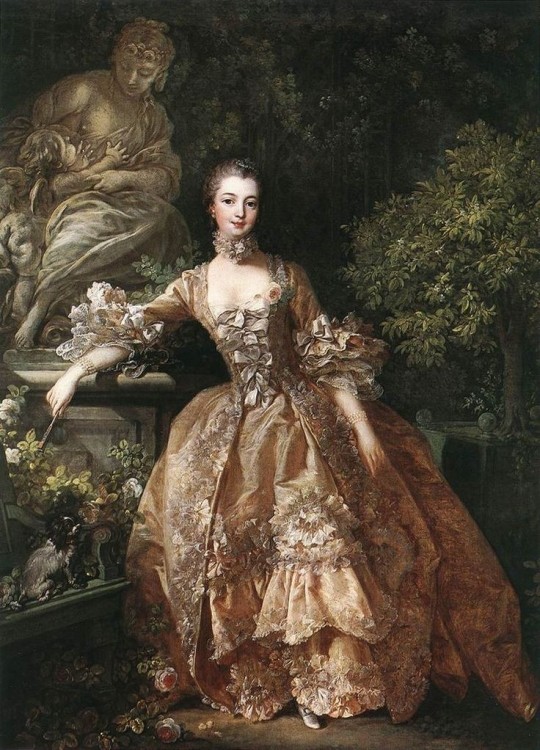
AKA, the member of the court
There was nothing Petronila hated more than Aboveground nobility, but she certainly appreciated their aesthetic and superficial way of life --after all, what she disliked was how riddled with politics they had become in her family.
Petronila lived as a resident of Versailles would. She went to party after party, busied herself with going shopping for ever the more lavish gowns, she was courted with multiple men at once (which may not have been something the humans her age were doing, not that she cared), and gossiped like there was no tomorrow. Truthfully, she was much like a Saz member of a royal European court, with only her libertine ways and insignia marking her as other.
--------------------
Antonia Carranza Fernández (1745-1814): la Ilustrada o la Afrancesada
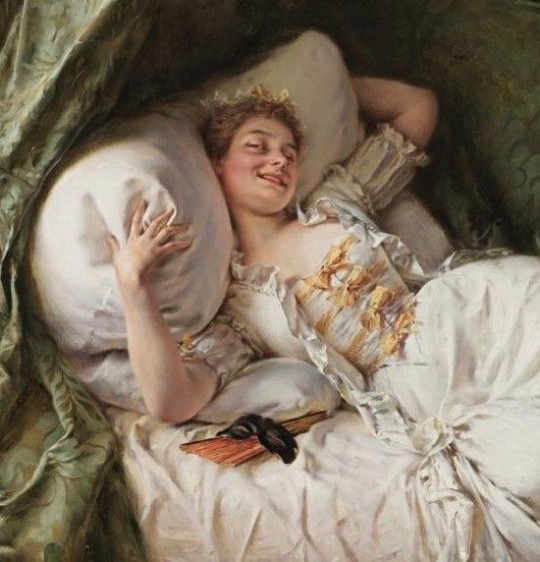
AKA, the enlightened or the frenchified
Antonia was perhaps the Carranza with the most faith in humanity. She lived at a time where the Enlightenment was gaining more and more power, and avidly encouraged it by owning a salon in Aboveground Madrid frequented by figures such as the Conde de Floridablanca or even Carlos III, whom she allegedly urged to shift Spain into a constitutional monarchy to no success.
When the War of Independence broke out, Antonia actually supported Napoleon's side. After all, she reasoned, Enlightenment and liberalism were already in Spain, there was no need to request another French king came back when the Frenchman there had created a constitution.
However, that didn't stop her from being terribly curious about the Constitution the Cortes de Cádiz was making, and was very pleasantly surprised to learn how progressive it was.
Rumour has it, that when Fernando VII was crowned king of Spain after the War of Independence was won and the Constitution of 1812 was ditched in favour of returning to absolutism, Antonia died out of sheer disgust.
--------------------
Cleofas Carranza Esquilache (1766-1936): la Cuenta Cuentos
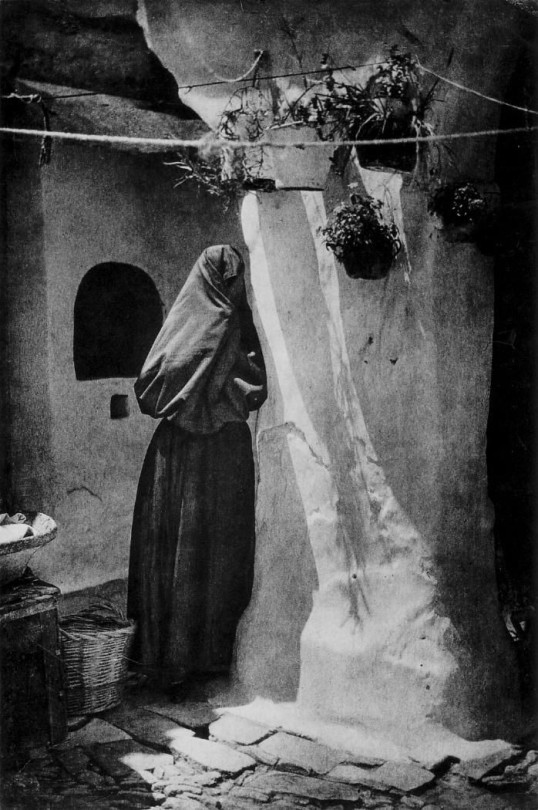
AKA, the storyteller
Cleofas never felt like dealing with humans approaching her for her crystal eye, so she dressed as a tapada de medio ojo and strolled through the streets of her village as if she were a ghost.
But Cleofas had a very macabre sense of humour, and so her desire to stay away from rude questions quickly morphed into a desire for doing mischief. She began standing next to shopkeepers, to whom she whispered 'you are standing on my tomb' in a frail tone; sitting by the elderly's side, taking their hands and whispering 'I know what you did'; and going to Church in the middle of mass to yell 'a sinner won't be able to cure you of your sins'. To the children, she liked to tell the stories she wrote and which the adults then used them to piece together the 'past' of the woman Cleofas had been when 'alive'.
The ominous whispering and yelling eventually stopped once Cleofas grew bored, but the storytelling continued. Soon she'd become a loving staple in the community, with the children and parents cherishing her stories of rotten princesses and murdered princes, and even making puppet plays out of them.
Once the Spanish Civil War started, the village became one of the first places to be raided by the fascists. The unorthodox, irreligious way in which it had evolved scandalised and quickly prompted them to kill the people that had become Cleofas's external family. Cleofas was so devastated, she asked to have her body de-cryogenised so that she could die. Her last words were: death and suffering belong in my stories, not in a country, not among siblings.
Tapadas de medio ojo/cobijadas were women who covered themselves in a black, thick veil that hid anything but the left eye. From what I've read, it could've originated from the times Muslims controlled a big portion of the peninsula, from the Spanish themselves or even from Jewish people. Also from what I've read, tapadas de medio ojo were seen with the most assiduity in the 17th century, and they usually were wealthy prostitutes or just women in general who wanted anonymity (though this later led to problems such as brothers thinking their sisters were someone they could have relations with). Cleofas isn't the only one who liked wearing the tapadas's veil --Dionisia, Urraca and others wore it as well-- but she was the one known for it because she refused to tread Aboveground with her face, thus prosthetic eye, uncovered.
--------------------
Ifigenia Carranza Esquilache (1802-1884): la Jueza o el Cuervo
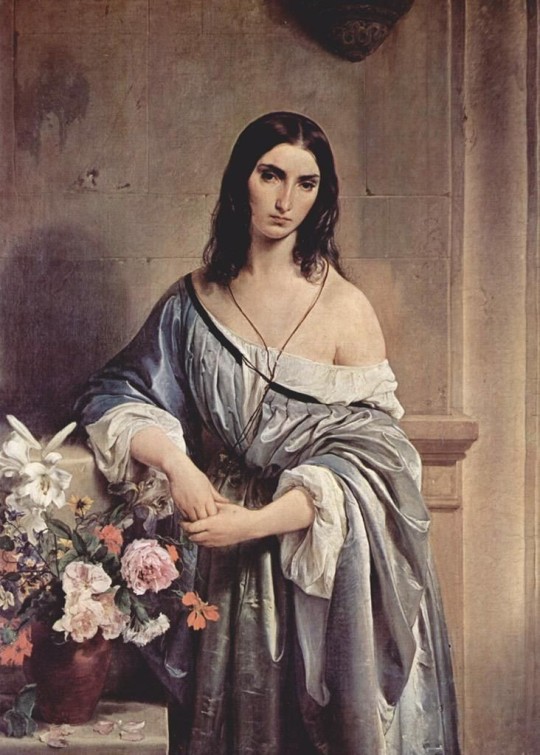
AKA, the judge or the raven
Ifigenia had a reputation for being scary, even more so than her mother. She was ever-serious and surrounded by her unkindness of ravens, whom she adored as her pets and due to which the sobriquet 'the raven' was coined to refer to her.
Her other sobriquet, 'the judge', was a result of her accurate judgements of people and situations. If Ifigenia said someone was bad, then their evil was always, eventually, discovered; if Ifigenia said an earthquake would occur in two days, then two days later the ground would begin to shake.
Ifigenia was originally called 'the oracle', but she openly criticised that term. "I'm not an oracle who gets her information from the future through a magical source," she'd say, although she never revealed how she knew so much.
Only her mother Cleofas, to whom she was really close, knew said source: mathematics.
--------------------
Crespa Carranza de Lisón (1825-1902): la Titiritera
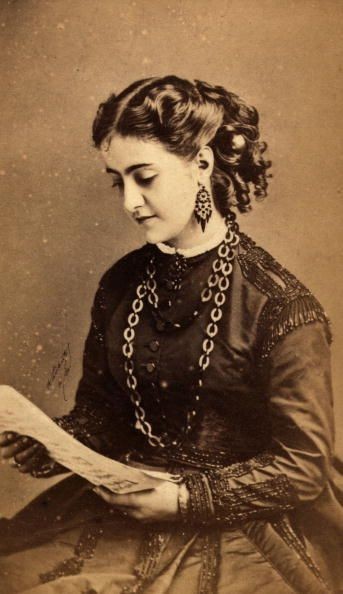
AKA the puppeteer
Crespa is one of the most intelligent Carranzas.
Born a woman in absolutist Spain, there was no hope for her to receive any education Aboveground other than in the Carranzas's own school-hid-as-convent, but Crespa refused to do so from a young age. Instead, she donned men's clothes and passed as a boy at a human school until she was fourteen --getting her Saz education in her free time-- and when she became fourteen, she resulted to using her male friends as a means through which enriching her knowledge.
To do that, she would hide in the classrooms's closets (sometimes even ceilings and floor) to hear the lessons, and fully take possession of her friend to answer the questions her teachers asked and voice any doubts she might have (something atypical of her). This took a lot of concentration and proficiency in her insignia, such a proficiency The Kinship had never before seen --therefore Crespa passed on to be known as simply 'the puppeteer'.
Her strategy was employed during university, and then during her job as a professor in the Universidad de Salamanca, but at that time, it was her husband (someone who was otherwise a househusband) who she controlled.
Crespa kept her strategy a secret from all but one human: Miguel de Unamuno*, who became her favourite author as well as her closest human friend later on in life.
*Nothing to say but I really fucking respect this guy. He thought for himself, he had the balls to tell the fascists they were wrong during an event he'd been invited to expressly to praise them during the Civil War, he admitted he was wrong in supporting them at the beginning of the war (the tags of this + the fact that the ii Republic was overall a mess are the explanation --Unamuno didn't sympathise with the fascists, and in fact was exiled in the 1920s because he openly criticised the proto-fascist dictatorship of the time).
--------------------
Gregoria Carranza Tresfuentes (1872-1931): la Libertina

AKA the libertine
Gregoria wasn't much for knowledge nor intellectual pleasure. She wanted to party, sleep with men without a care for respectability or consequences, read heated books and write even more heated letters to her many lovers, discard social conventions without a care, dress however she liked wherever and whenever she liked.
In all, everyone just agrees Gregoria was the pure embodiment of everything a libertine should be.
--------------------
Ifigenia Carranza de Ure (1892-1979): la del Destino de Desgracias

AKA the one with the destiny made of bad luck
The Kinship knows Ifigenia as the unluckiest Carranzas. She used to be a cheerful girl, then a loving wife, then a devoted mother to her three daughters, but the Spanish Civil War broke her happiness.
Ifigenia saw her family fall apart when her oldest daughters joined each one of the opposing bands and shrugged off their Saz identity. Ifigenia was the one who carried their bodies to their caskets, and then explained to her youngest daughter what had happened to her sisters.
After the Civil War, Ifigenia made it her mission to spread the news of what had happened across Mirror, to let everyone who would listen to her of the dangers of political extremism, populism, and the ideologies that ran rampant at the time. During World War II, she played a key role in the assembly of the Escuadrones Ajenos, that were a wide-scale project to try to save not only Saz, but humans as well, from the atrocities committed during the war. However, the Escuadrones Ajenos were discontinued after continuous failure to protect humans due to technical reasons and the actions of other humans*, thus marking yet another cause of distraught in Ifigenia's life.
Happiness was wrenched from Ifigenia in 1937, and she never gained it back until the General Franco died in November 1975: the month she lived more than him was probably the happiest time of her life.
*WWII was the most catastrophic war in history, and I can see why making fantasy a prominent element of it might not be the wisest thing to do. Let's just say that during military conflict, The Kinship just actively works towards aiding their own, because there are a fuck ton of Saz so that's a fit in and off itself and they don't want to know what the repercussions of Aboveground finding them out would be (eg #1: humans demonising them for being different and thus making Aboveground unsafe; eg #2: WWIII breaking loose because human governments want Mirror's natural resources or Saz to experiment with in order to artificially make humans Saz, so countries form alliances to attack Mirror a la Blitzkrieg or some shit, which would result in several million deaths; eg #3: a witch-hunt like situation happens within human governments because they think everyone is a potential Saz spy, and human governments going to shit = countries going to shit = the lives of the Saz living in those countries and with the humans from them going to shit). There are Saz that can have a more active role in wars, but they're not backed by the government, and if the actions they're going to carry out go fundamentally against other Saz (eg being a Nazi, because there are Jewish Saz who Hitler definitely thinks should be in concentration camps), they lose the ownership over their nationality and using their insignia --or any other Saz marker, including speaking Sazla-- is prohibited under risk of prosecutors killing you for it if humans find out about insignia.
--------------------
Eulalia Carranza Machado (1913-1939): la Apátrida o la Católica

AKA the stateless or the catholic
--------------------
Eulalia renounced of her Saz identity when she decided to join the self-named national band during the Spanish Civil War. She was known to have been pushed into the conflict following the start of the Red Terror, due to the impact the systemic persecution of the clergy had on her.
Leonor Carranza Machado (1915-1939): la Apátrida o la Roja
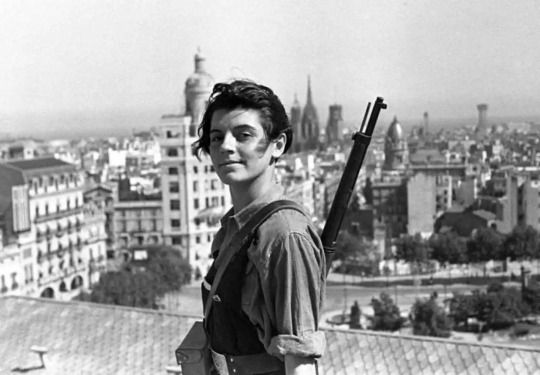
AKA the stateless or the roja
Much like her older sister, Leonor abandoned her Saz identity the moment she decided to take an active role in the republican side of the Spanish Civil War, becoming, thus, stateless. Many in Mirror also know her with the term 'roja', which was used as a derogatory term for left-leaning individuals.
--------------------
Matea Carranza Machado (1931-2016): la Buena Hermana
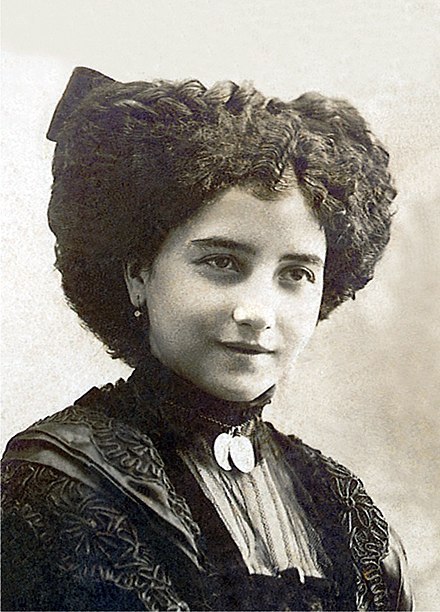
AKA the good sister
After Eulalia and Leonor turned their back on their country, the whole family turned to their younger sister, Matea, for hope. And Matea fulfilled their wish.
Matea's life was full of accomplishments, and yet she's remembered for the easiest --but most significant-- of them: being the better of the three Carranza Machado sisters.
#the kinship chronicles#am I putting my knowledge of history into good use?#yes yes I am#viva la pepa#nfidndisnwiwneiwwjwowndu honestly fuck fernando and his wife and his brother and all the silly absolutists who didn't want the constitution#*I* wouldn't want it rn because it's old but?#it abolished the inquisition? gave the people in the colonies the same rights as people in the peninsula? established spain as a democracy?#like I'd like to have maintained that constitution and not whatever the fuck was fernando and then his daughter's reign was#the constitution of 1869 can remain but the other four have no rights I hate it here#fernando and carlos should've died in bayona or something so that francisco de paula could reign#and *then* his gay politically-pliable son could've reigned next and then the cortes would have controled stuff and there would be democrac#democracy and then I'd have more info on the gay king's romance which tbh sounds nice because he only had one lover#en fin la hipotenusa#btw ifigenia was like a walking computer/algorithm/ya tu sabes#like mathematics could genuinely 'see the future' and she's the embodiment of that#btw clearly talking very little about leonor and eulalia because they have their own book lol
0 notes